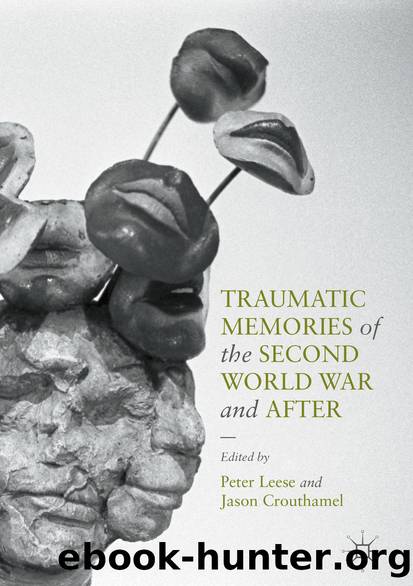Traumatic Memories of the Second World War and After by Peter Leese & Jason Crouthamel

Author:Peter Leese & Jason Crouthamel
Language: eng
Format: epub
Publisher: Springer International Publishing, Cham
In another case, Ludwig Loubl, a schoolteacher from Wolfersbach, attached a letter to his questionnaire that read: âThe town clerk, Kathi Sigl, still has her job, though she is a Party Member and the daughter of the innkeeper Johann Sigl who himself was an ardent Nazi.â 41
With such a widespread practice of voluntary denunciation, an environment of distrust and anxiety was continued and reinforced in postwar German society. Germans who hoped to retain employment or to seek new opportunities in the workforce, an endeavor that was fundamental to individuals and families during the devastating economic climate of the immediate postwar years, were faced with the concern of being personally denounced. While attempting to rebuild and recover from the physical and psychological devastation of the war and the violent collapse of the National Socialist regime, Germans were not only required to function within an environment in which they possessed relatively little autonomy and where fear of the occupation authorities was commonplace for many, but also within a community that was socially fragmented and where personal and collective recovery from psychological trauma was inhibited by the prevalence of accusations, rumors, lies, and deceit. Although these conditions were common under the Third Reich, they were perpetuated by the military governments and their denazification Fragebögen.
The detrimental effects that this program had on the mental health of German citizens did not go unnoticed by the occupation authorities or by local community leaders. In a widely circulated memorandum written in May 1946 by the Control Commission for Germany (British Element), an official request was made for the Standing Committee on Denazification to take authoritative action to discourage political denunciations. In an anxious letter, the Chief of the British Legal Division expressed his concern about the âmalicious denunciationsâ being made within the German legal community, explaining that âcivil servants appointed with the approval of the Military Government were suffering from a feeling of insecurity as a result of the fear of denunciations made against themâ and that âthis practice of denunciation, which now threatens under the guise of denazification, is strongly reminiscent of Nazi methods.â 42 Suspecting a wider prevalence of denunciations, the officer concluded that âthere is fear that similar feelings are rife in other fields of German administrative business and industrial life.â
Also in the spring of 1946, in a joint Pastoral letter written by leading members of the German Protestant Church, a petition was made to all four military governments, asking for the elimination of the denazification Fragebogen, or at the very least an alteration of its content. Later incorporated into the Churchâs âofficial positionâ on the Allied occupation, the letter commented that âthe questions in the Fragebogen, not surprisingly, tempt [the respondent] in some instances to lie and encourages denunciation. This is not beneficial to the moral recovery of the people.â 43 According to the Church, denazification âencouraged a wave of denunciation followed by mutual distrust and hatred among the peopleâ and that attempts by the Allied powers to purge the German political and economic spheres had âdeteriorated into a program of revenge.
Download
This site does not store any files on its server. We only index and link to content provided by other sites. Please contact the content providers to delete copyright contents if any and email us, we'll remove relevant links or contents immediately.
| Africa | Americas |
| Arctic & Antarctica | Asia |
| Australia & Oceania | Europe |
| Middle East | Russia |
| United States | World |
| Ancient Civilizations | Military |
| Historical Study & Educational Resources |
The Light of Days by Judy Batalion(1107)
First Platoon: A Story of Modern War in the Age of Identity Dominance by Annie Jacobsen(961)
Stalin's War: A New History of World War II by Sean McMeekin(891)
The Pacific War 1941-1943 by James Holland(830)
Walk in My Combat Boots by James Patterson(792)
The American War in Afghanistan by Carter Malkasian(776)
Victory's Price (Star Wars) by Alexander Freed(760)
The Vietnam War: An Intimate History by Geoffrey C. Ward & Ken Burns(759)
Blood and Ruins: The Great Imperial War, 1931-1945 by Richard Overy(728)
Operation Pedestal by Max Hastings(711)
Concepts of Space by Jammer Max;(693)
Extreme Fitness by Chris McNab(692)
Cold War (Alexander King Book 2) by Bradley Wright(691)
The Madman Theory by Jim Sciutto(674)
Flying Tiger by Samson Jack(664)
World War II Infantry Fire Support Tactics by Gordon L. Rottman(644)
Pathfinders by AL-KHALILI JIM(636)
Bismarck by Jean-Paul Bled(626)
Panzerkrieg by Mike Syron(623)
